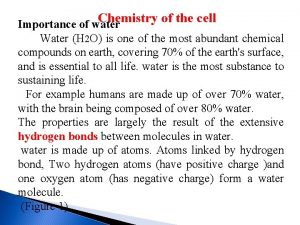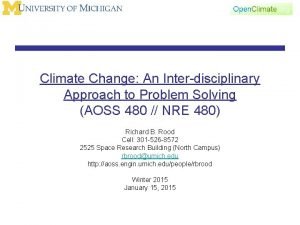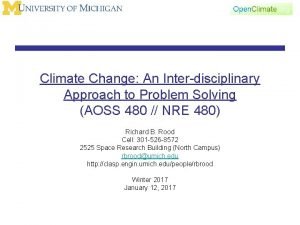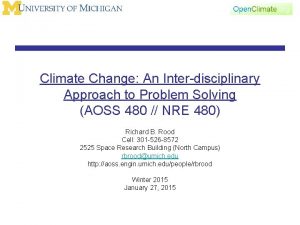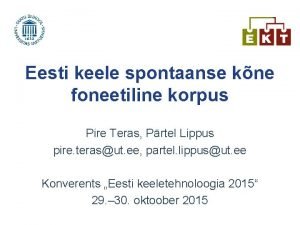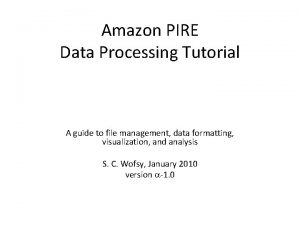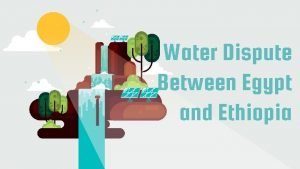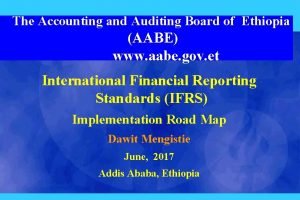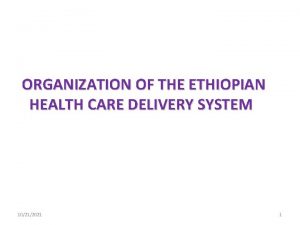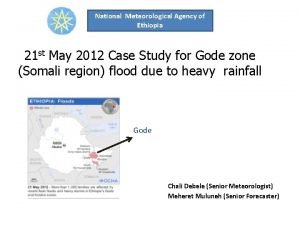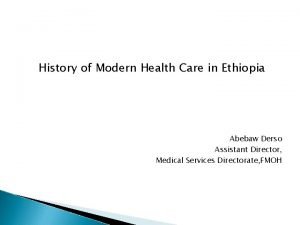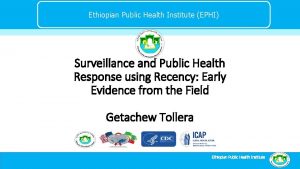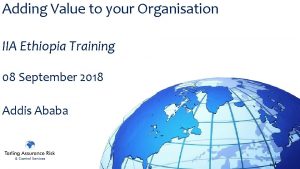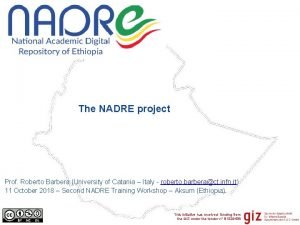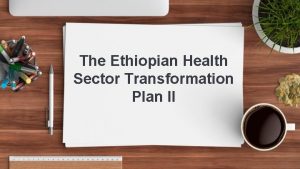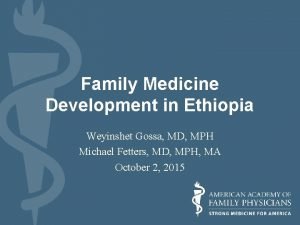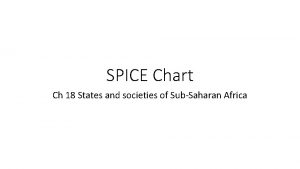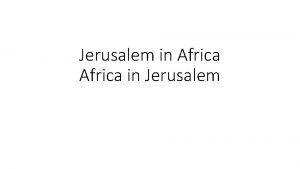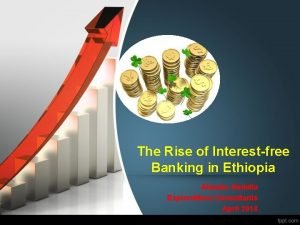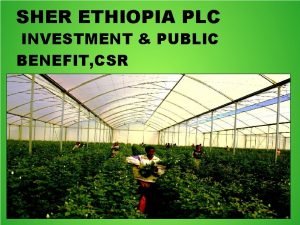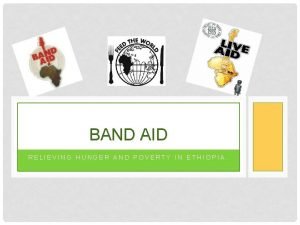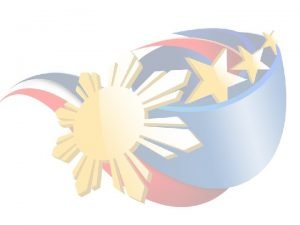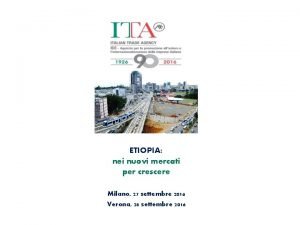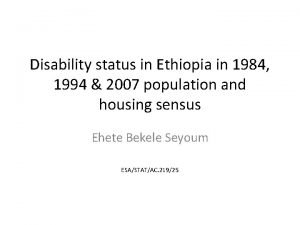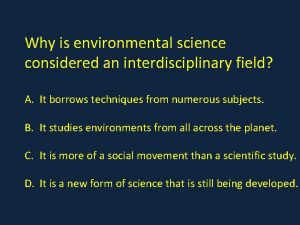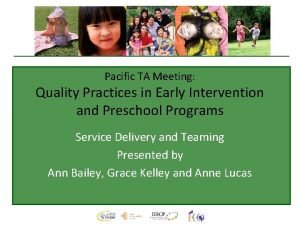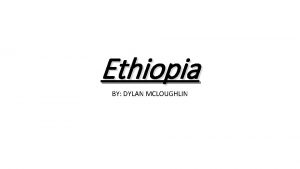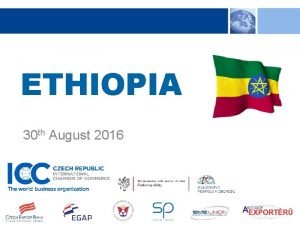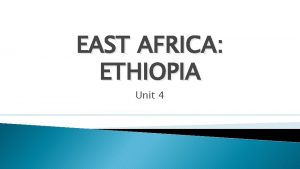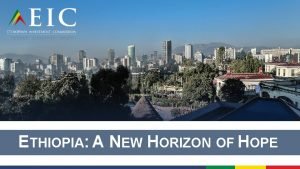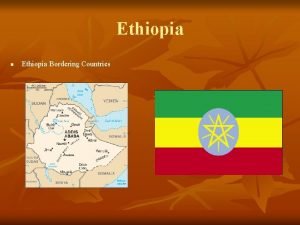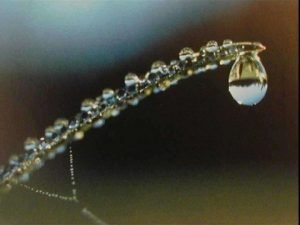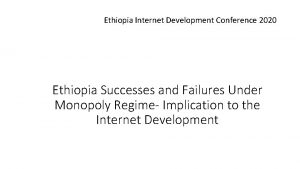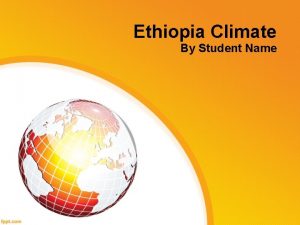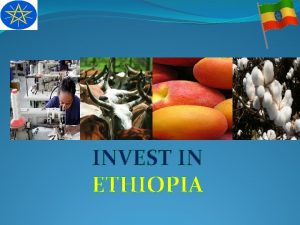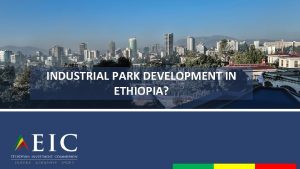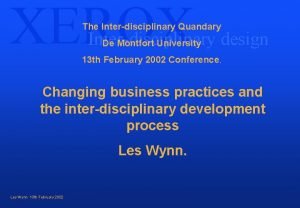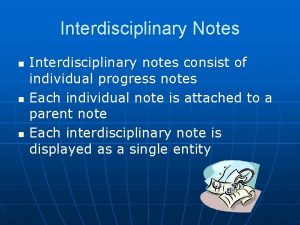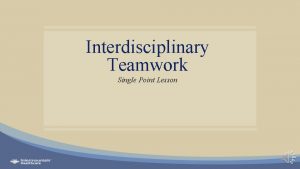PIRE Taming Water in Ethiopia An Interdisciplinary Approach






























- Slides: 30

PIRE: Taming Water in Ethiopia An Interdisciplinary Approach to Improve Human Security in a Water-Dependent Emerging Region PIRE Water and Food Security Project Undergraduate Research informational Meeting, November 12 th, 2018

Dr. Zoi Dokou PIRE Project Manager Assistant Research Professor Department of Civil and Environmental Engineering, University of Connecticut Email: zoi. dokou@uconn. edu PIRE Water and Food Security Project Undergraduate Research informational Meeting, November 12 th, 2018

Period: April 2016 – May 2022 US Institutions: Connecticut (lead) PIRE Project Team Institute International Institutions: Ethiopia Water Resources) University of Wisconsin University of Oklahoma International Food Policy Research Addis Ababa University(Ethiopian Institute of Bahir Dar University-Ethiopia University of Kassel-Germany University Joseph Fourier-France University of Reading-UK Stakeholder Organizations: (Ethiopia) PIRE Water and Food Security Project Abbay Basin Authority Ministry of Water Irrigation and Energy National Meteorological Agency Undergraduate Research informational Meeting, November 12 th, 2018

Motivation Help stakeholders manage climate variability to improve crop and energy production PIRE Water and Food Security Project Impacts of rainfall on Ethiopia GPD and Agri. GDP (from World Bank, 2006) Undergraduate Research informational Meeting, November 12 th, 2018

Project Aim Understand how the relationships between scientists, farmers, water managers, and other authorities influence the production, dissemination, and outcome of new scientific knowledge Dual Objectives Improve seasonal hydrologic and crop yield forecasts at scales relevant to farmers and water managers; and test a politicalinstitutional model of science that challenges the assumption that innovation leads automatically to improved human security. PIRE Water and Food Security Project Undergraduate Research informational Meeting, November 12 th, 2018

Expected Outcomes Project Aim Understand how the relationships between scientists, farmers, water managers, and other authorities influence the production, dissemination, and outcome of new scientific knowledge EIWR students discussing water sanitation solutions with communities. PIRE Water and Food Security Project - Enhance crop and energy production in normal years and minimized losses during climatic extremes; - Identify and reduce sociopolitical barriers to effective forecast development, dissemination and uptake - train a new generation of global experts who recognize the political-institutional and climate -ecological dimensions of complex food-energy-water problems. Undergraduate Research informational Meeting, November 12 th, 2018

Research Framework Front end Forecasting (‘back end’) USERS • • • Historical Data In situ obs from ABA and NMA (AWS, GW, SF, HIS) Reanalysis (35 yrs, 25 km/3 -hourly) Satellite data (P, ET, SM) Web. GIS SMS • • • Modeling Hydrologic (watershed/GW) Crop growth and yield Economic Social behavior - Agent Based Modeling E-ping app • Near-Real-Time Data Seasonal forecasts (monthly; 6 -9 mon lead) Initial soil moisture from LDAS (monthly) Lake, GW, river levels and soil moisture (monthly); Local data from Citizen Science Initiative; Analogs (monthly) • • Dissemination Case Studies Irrigated Ag communities • Projected reservoir releases • Crop yields during dry season Rain-fed Ag communities • Projected SM/P conditions • Crop yields during wet season Water Management Authorities • Projected lake levels during wet season • Optimal reservoir management scenarios • Economic projections Social investigations 4 agricultural communities and 2 water management authorities Surveys Ethnographic investigations Simulations of farmers’ behavior and economic impacts • Ph. Ds, Publications (interdisciplinary/individual components), Conference presentations th, 2018 Policy outreach activities (IFPRI) PIRE Water • Water and Food Security Project November and Food Security Project Undergraduate Research informational NSFMeeting, Site Visit: April 2 -3, 122018

Social Science 1) Site selection 2) Methodology of social investigations Fall 2017 Data Collection 1) Global data sets 2) Local agricultural data 3) In-situ hydro/meteo data Engineering 1) Downscaled forecasts 2) Watershed/GW model 3) Crop yield model Project Implementation April 2018 May 2018 Summer 2018 Dissemination e. PING app Annual Meeting 17 -18 May (DC) Economic/Social Modeling Preliminary results from economic model First test of the models Trip to Ethiopia (May – Aug) 1) Stakeholder workshop 2) Language training 3) Research studies Agent based model planning Social Science 1) Conducting surveys 2) Collecting ABM social data Web-based “PIRE Graduate Student Brownbag Series” (Launched November 2017, twice a year throughout the project) Language acquisition for ethnographers 2016 – Fall 2018) PIRE Water and Food Security Project PIRE Water and Food(Fall Security Project th, 2018 Undergraduate Meeting, November NSFResearch Site Visit: informational April 2 -3, 2018 NSF Site Visit: April 2 -3, 122018

Project Implementation In situ stakeholder and citizen science data transmitted through the e-ping app Fall 2018 1) Finalizing the forecasting system 2) Training ABM based on input from survey data 3) Preparing for the ethnographic visits Spring 2019 Summer school and undergraduate research in Ethiopia 2020 Stakeholder/policy outreach workshop based on initial results 2021 Stakeholder/policy outreach workshop Student studies in Ethiopia Social Investigations testing hypotheses Running the forecasting system: Issuing seasonal crop yield and hydrologic forecasts on monthly basis (Jan 2019 – Dec 2021) Ethnographic field work (EFW) PIRE Water and Food Security Project informational Meeting, November 12 th, 2018 Spring-Fall 2019 with 2 -month Undergraduate follow-up visits in. Research 2020 and 2021

Engineeri ng Research Highlights • Integrated Modeling Framework • Seasonal Forecasts • Watershed Modeling PIRE Water and Food Security Project • Groundwater Modeling • Crop Yield Modeling • Citizen Science Initiative for Data Collection Undergraduate Research informational Meeting, November 12 th, 2018

Seasonal Forecasts Research Watershed Model Highlights Integration of watershed, groundwater and crop yield models 1. Recharge Rates 2. Soil Moisture 3. Streamflows n tio da li Va PIRE Water and Food Security Project Forecasting Framework Groundwate r Model 1. Lake Levels 2. Groundwater Levels 3. Soil moisture dynamics Initialization Citizen Science data Crop Yield Model n tio a d li a V Undergraduate Research informational Meeting, November 12 th, 2018

Faculty and Graduate Students Research Highlights Citizen Science Initiative: promoting citizen participation in science Faculty and Graduate Students PIRE Water and Food Security Project Teachers and High School Students Who is involved from Ethiopia? 4 high schools 12 high school students 4 high school teachers 4 graduate students Faculty Supervisors: Seifu Tilahun, Mamaru Ayalew Moges, and Muluken Azage, Bahir Dar University What are they doing? Collecting river stage, soil moisture and ground water level data Planning college-ready Undergraduate Research informational Meeting, Novemberactivities 12 th, 2018

UConn’s engagement: Research Highlights Citizen Science Initiative: promoting citizen participation in science High school students taking river stage measurements as part of the Citizen Science Initiative in Blue Nile Basin, Ethiopia PIRE Water and Food Security Project • Supplied the equipment: i. Pad mini, shallow well meter, soil moisture meter, tripod, rod, autolevel • Providing stipends for Ethiopian collaborators and supported schools • Trained students and faculty • Data will be used for a) initialization of the models for the dry season; and b) validation of the predictions made each wet season 2018 through 2022 • Social scientists plan to participate and observe the project in 2019 and 2020 Undergraduate Research informational Meeting, November 12 th, 2018

Nabil Tueme Graduate Student Department of Sociology, University of Connecticut Email: nabil. tueme@uconn. edu PIRE Water and Food Security Project Undergraduate Research informational Meeting, November 12 th, 2018

How do the relationships between scientists, farmers, water managers and other authorities, influence the production, dissemination and outcome of new scientific knowledge? PIRE Water and Food Security Project Undergraduate Research informational Meeting, November 12 th, 2018

Research Plan PIRE Water and Food Security Project Conduct longitudinal research that combines physical and social scientific data to test three competing models of scientific enterprise Undergraduate Research informational Meeting, November 12 th, 2018

• (Null) Pure Science: Communities experiencing greater hydro-agronomic vulnerability will benefit more from forecasts than other sites. The politicalinstitutional relationships have marginal influence over outcomes (RO & RC > IO & IC). Research Plan PIRE Water and Food Security Project • (Hypothesis 1) Institutional Model of Science: the more institutionalized communities will implement forecasts at higher rates irrespective of hydroagronomic variability and the quality of institutions (H > IO& IC > RO & RC). • (Hypothesis 2) Political-Institutional Model of Science: Open communities will exhibit greater benefits than closed communities irrespective of hydro -agronomic variability, even when improved forecastbased information at the farm scale, political institutional factors such as voice, trust, and fair grievance practices will prove stronger than hydroagronomic factors (IO & RO > IC & RC). th Undergraduate Research informational Meeting, November 12 , 2018

Our Working Hypothesis: A political institution model of science • We often treat scientific investigation as apolitical or valueneutral. Yet, science is a socially situated human practice. As such, science is inherently fallible. Thus, every scientific enterprise involves a certain degree of scientific uncertainty. What are the best practices for communicating scientific uncertainty to non-scientists? Political-institutional factors shape the development and transfer of scientific knowledge What are the factors that impede the effective dissemination and uptake of new scientific knowledge? PIRE Water and Food Security Project Political-institutional theory directs our analytic attention to factors such as grievance practices, forms of voice and representation, and structural inequalities. Undergraduate Research informational Meeting, November 12 th, 2018

Identifying Politicalinstitutional Constraints Obtain a detailed understanding of decision-making contexts, interactions between forecast producers and users, and the ways that potential forecast users respond to scientific uncertainty. Understand the social organization of water, agriculture, hydropower and science Ethnography Surveys Measure the impact on decision-making across five types of communities Compare outcomes Identify mechanisms by which improved forecasts influence decision-making PIRE Water and Food Security Project Undergraduate Research informational Meeting, November 12 th, 2018

The Social Organizatio n of Water, Agriculture, Hydropower, and Science Water becomes organized in social endeavors through: A. Formal institutions like public irrigation systems and reservoir operations B. Informal practices like indigenous forecasting; and C. forms of governance PIRE Water and Food Security Project Undergraduate Research informational Meeting, November 12 th, 2018

Deploy U. S. and Ethiopian ethnographers across four farming communities and one hydropower community to observe and talk to stakeholders as they negotiate the potential risks and rewards of new scientific knowledge. Ethnograph y Each team will produce observations (“field notes”) of the everyday interactions surrounding water and agricultural practices and also their community's relations with local and regional governmental sectors and other surrounding communities. Field notes from all teams will be combined into a single qualitative database to facilitate comparative insights that distinguish between the experiences people have with scientific knowledge in open and closed systems and rain-fed and irrigated farming and hydropower communities. PIRE Water and Food Security Project Undergraduate Research informational Meeting, November 12 th, 2018

Ethnograp hy Farmer A may choose to plant sorghum because he believes in our forecast-based guidance. Farmer B plants sorghum because he is following the lead of his respected neighbor, Farmer A. Farmer C plants sorghum when he really wants to plant teff because he is afraid to act in defiance of the district agronomist. All three are “adoption” but the mechanisms by which new scientific knowledge influences the farmers are very different. If we code an act as one of "adoption” - We would code each act of forecast adoption as an act by a specific research participant (e. g. “Farmer A”). We would code knowledge transfer dynamics (e. g. the participant can name the components of the forecast; the participant accessed the cellphone app prior to planting; the participant made positive remarks about the forecast to a listener; etc. ) PIRE Water and Food Security Project Undergraduate Research informational Meeting, November 12 th, 2018

Collect primary data on forecast adoption and secondary data on crop and water management outcomes. Surveys To measure adoption in the farming communities, we will record plating time, crop type and area, and fertilizer practices at the household level. In irrigated communities, we will also observe water allocation from the irrigation source. PIRE Water and Food Security Project Undergraduate Research informational Meeting, November 12 th, 2018

Comparing outcomes: Measuring Politicalinstitutiona l Constraint s Evaluate relative outcomes in adoption rates and cropping practices by comparing communities Evaluate relative outcomes in adoption rates and cropping practices by comparing between communities (control groups) Evaluate outcomes in adoption rates and cropping practices by evaluating forecast and no-forecast (business as usual) approaches at the individual farmer and community scales. Identifying mechanisms: Use a multi-stage, collaborative coding process for field notes using a qualitative analysis software. Identify and code acts of adoption, capturing nuances in the outcomes. Theorize the mechanisms that produce outcomes by uncovering how specific barriers impede the effective dissemination and uptake of forecast-based knowledge PIRE Water and Food Security Project Undergraduate Research informational Meeting, November 12 th, 2018

Gender What is the role of women in water-based decision-making? What challenges to women face in water collection and use? Knowledge production How is an idea produced and accepted and why? What’s Your Role? Politics What political factors impact water-based decision-making? How are people in various social locations differently impacted by policies? Collective behavior and social movements How do people challenge the policies that do not work for them? Culture How do deeply embedded values, morals, and beliefs impact water-based decision-making? PIRE Water and Food Security Project Undergraduate Research informational Meeting, November 12 th, 2018

Reading groups Contemporary issues on food and water security in Ethiopia Spring Workshop Seminars on major engineering projects in the country from a sociological standpoint Seminars on Food Water Energy nexus Cultural introduction Basic Language skills PIRE Water and Food Security Project Undergraduate Research informational Meeting, November 12 th, 2018

When? June Duration? 1 month Ethiopia Trip What will I do there? Participate in summer school in Bahir Dar (2 weeks) Data collection for individual research project Data collection for PIRE project under guidance of graduate students and faculty members Visit Addis Ababa Are the expenses for the trip covered by the project? Yes! Can I still participate in the project even if not selected for the trip? Yes! PIRE Water and Food Security Project Undergraduate Research informational Meeting, November 12 th, 2018

Elizabeth Holzer Associate Professor Department of Sociology, University of Connecticut Email: elizabeth. holzer@uconn. edu PIRE Water and Food Security Project Undergraduate Research informational Meeting, November 12 th, 2018

Phoebe Godfrey Associate Professor Department of Sociology, University of Connecticut Email: phoebe. godfrey@uconn. edu PIRE Water and Food Security Project Undergraduate Research informational Meeting, November 12 th, 2018

Questions? PIRE Water and Food Security Project Undergraduate. Researchinformational. Meeting, November 12 12 thth, , 2018
 Water and water and water water
Water and water and water water Interdisciplinary approach to problem solving
Interdisciplinary approach to problem solving Global carbon project
Global carbon project Interdisciplinary approach to climate change
Interdisciplinary approach to climate change Pire teras
Pire teras Amazon pire
Amazon pire Ethiopia water
Ethiopia water Aabe application form
Aabe application form Six tier health system in ethiopia
Six tier health system in ethiopia Ethiopian meteorological agency
Ethiopian meteorological agency History of modern medicine in ethiopia
History of modern medicine in ethiopia Hiv case-based surveillance in ethiopia
Hiv case-based surveillance in ethiopia Iia ethiopia
Iia ethiopia Nadre ethiopia
Nadre ethiopia Health sector transformation plan ii ethiopia
Health sector transformation plan ii ethiopia Family medicine in ethiopia
Family medicine in ethiopia Psychiatry in ethiopia
Psychiatry in ethiopia Mali spice chart
Mali spice chart Ethiopia street jerusalem
Ethiopia street jerusalem Esap ethiopia
Esap ethiopia Challenges of interest free banking in ethiopia
Challenges of interest free banking in ethiopia Ethiopia constitution
Ethiopia constitution Sher ethiopia plc
Sher ethiopia plc Invest in ethiopia
Invest in ethiopia Band aid 2010
Band aid 2010 Mga europeong nanguna sa eksplorasyon
Mga europeong nanguna sa eksplorasyon Ethiopia religion
Ethiopia religion History of disability in ethiopia
History of disability in ethiopia Italy invades ethiopia reaction
Italy invades ethiopia reaction Why is environmental science considered interdisciplinary?
Why is environmental science considered interdisciplinary? Multidisciplinary vs interdisciplinary
Multidisciplinary vs interdisciplinary
